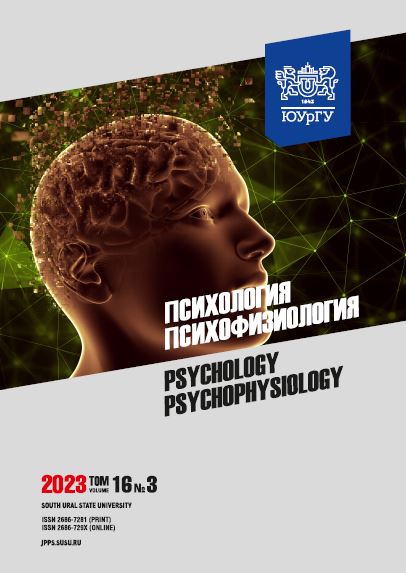Personal and socio-professional characteristics of heads of schools with different organizational cultures. Part 2: Comparative analysis of relationships
Abstract
Background. This paper is part of a series of scientific publications about the personal and socio-professional characteristics of heads of schools with different organizational cultures. The first part of the study contains the problem statement, research question, conceptual framework, and first results. The second part of the study deals with an empirical evaluation of the hypothesis about differences in the structure of interactions between the personal and socio-professional characteristics of heads of two types of schools. Aim: to identify the personal and socio-professional characteristics of heads of schools with different organizational cultures. Materials and methods. The study involved 85 heads of leading schools and 67 heads of schools with low learning outcomes in the Leningrad Region. Value-semantic attitudes and leadership style were considered personal characteristics, while the socio-professional ones comprised team roles, self-assessment of project competencies, managerial experience, and position. The following techniques were used: the Choice of Proverbs technique by N. Markina, the Multifactorial Leadership Questionnaire by B. Bass and B. Avolio, the Team Role Inventory by R. Belbin, and the authors’ questionnaire for self-assessment of project competencies. Statistical processing was carried out using the Spearman's rank correlation coefficient. Results. The systemic and diffuse types of organizational cultures in schools with different learning outcomes were empirically substantiated. The structure of interactions between value-semantic attitudes and self-assessment of project competencies, team role, managerial experience, and age was investigated. Conclusion. The study shows that organizational culture and different levels of learning outcomes can be determined by the culture of management, which is the actualization of a manager’s personal and socio-professional characteristics.
Downloads
References
2. Barkova J.K., Selezneva E.V., Sinyagin Yu.V. Top managers concept of relationship between management team efficiency factors and their value orientations. Vestnik Moskovskogo gosudarstvennogo oblastnogo universiteta = Bulletin of Moscow Region State University. 2021;2:166–187. (in Russ.). DOI: https://doi.org/10.18384/2224-0209-2021-2-1074
3. Dyachkova M.A., Tomyuk O.N., Shutaleva A.V., Dudchik A.Yu. Inclusive organizational culture as a culture of diversity acceptance and mutual understanding. Perspektivy nauki i obrazovaniya = Perspectives of Science and Education. 2019;41(5):373–385. (in Russ.). DOI: https://doi.org/10.32744/pse.2019.5.26.
4. Usova S.N. Career guidance for schoolchildren: new solutions and practices of Moscow oblast leading schools. Innovatsionnye proekty i programmy v obrazovanii = Innovative projects and programs in education. 2022;2(80):46–53. (in Russ.).
5. Novoselova S.Yu., Potemkina T.V., Gracheva L.Yu., Bolotina T.V. Analytical review of international practices on support of low-performing schools. Innovatsionnye proekty i programmy v obrazovanii = Innovative projects and programs in education. 2016;5:55–60. (in Russ.).
6. Bulgakov A.V. Humanity in the organization: in the context of the principle of cultural mediation. Vestnik RGGU. Seriya “Psihologiya. Pedagogika. Obrazovanie” = RSUH/RGGU Bulletin. “Psychology. Pedagogics. Education” Series. 2020;4:140–164. (in Russ.). DOI: https://doi.org/10.28995/2073-6398-2020-4-140-164.
7. Khotinets V.Yu., Kozhevnikova O.V., Baranova N.A. Congruence of the real and favored organizational culture of a modern regional company: value predictors. Rossiiskii psikhologicheskii zhurnal = Russian Psychological Journal. 2022;19 (3):232–245. (in Russ.). DOI: https://doi.org/10.21702/rpj.2022.3.15.
8. Gryazeva-Dobshinskaya V.G., Dmitrieva Yu.A., Markina N.V. Transformational leadership and managers strategic management settings. Vestnik Moskovskogo gosudarstvennogo oblastnogo universiteta = Bulletin of Moscow Region State University. 2018;3:111–133. (in Russ.). DOI: https://doi.org/10.18384/2224-0209-2018-3-915.
9. Markina N.V. Metodika diagnostiki adaptivnosti i aktivnoi neadaptivnosti [Methods of diagnostics of adaptability and active maladaptivity]. Sotsialnaya psikhologiya tvorchestva – 2007 [Social Psychology of Creativity – 2007]. Chelyabinsk: SUSU Publishing Center. 2007:153–163. (in Russ.).
10. Bass B.M. From transcendent to transformational leadership: Learning to share the vision. Organizational Dynamics. 1990;18(3):19–31. DOI: https://doi.org/10.1016/0090-2616(90)90061-S
11. Tikhomirov A.A., Spengler U.D. Leadership styles and merger success: transformational-transactional concept of leadership. Rossiiskii zhurnal menedzhmenta = Russian Management Journal. 2005;3(2):71–98. (in Russ.).
12. Gryazeva-Dobshinskaya V.G., Dmitrieva Yu.A., Glukhov P.S., Glukhova V.A. Innovative leadership and the psychometric problems of its diagnostics. Vestnik Yuzhno-Uralskogo gosudarstvennogo universiteta. Seriya: Psikhologiya = Bulletin of the South Ural State University. Series «Psychology». 2015;8(2):14–24. (in Russ.).
13. Belbin R.M. Tipy rolei v komandakh menedzherov [Types of roles in management teams]. Moscow: Hippo. 2003:240. (in Russ.).
References on translit
-Copyright (c) 2023 Psychology. Psychophysiology

This work is licensed under a Creative Commons Attribution-NonCommercial-NoDerivatives 4.0 International License.



